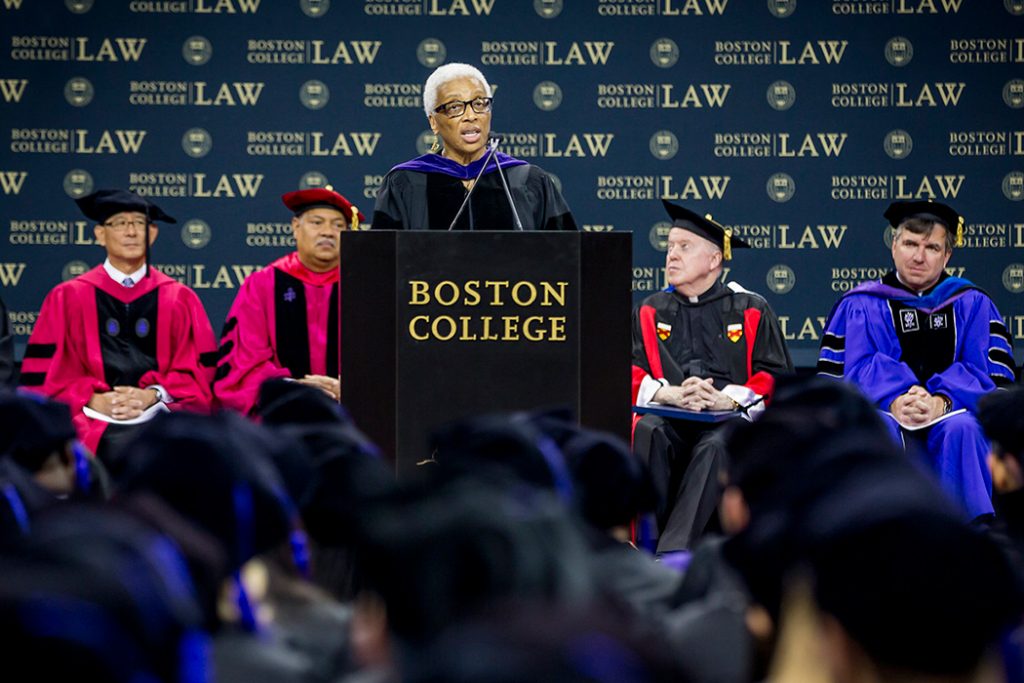Addressing the Boston College Law School Class of 2017, Geraldine Hines, associate justice of the Massachusetts Supreme Judicial Court, urged the graduates to “speak the truth.”
“When the rhetoric of our time seeks to undermine the principles underlying our constitutional democracy,” Justice Hines said, “your time spent here studying constitutional law will be put to good use. Silence is not an option.”
Justice Hines referenced the lawyers of her generation fighting against racism and segregation in the deeply divided South, as well as lawyers (like Sue Finegan, BC Law ’91) who fought against the recent immigration ban, in arguing that the law is a tool that must be used against discrimination and inequality. “Those of you who will take up the cause of the poor, the wrongly convicted, the immigrant, or any of the despised among us, together with people of good will, are the best defense against the retrenchment that some would like to see in our country. You cannot allow this to happen…equal justice under the law is still an aspiration.”
“At the end of the day, the story of your life in the law will be the story of the choices you have made as you travel along the path of your career,” she added. “Choose service. Choose hard work. Choose to make a difference. Be vigilant.”
In his address, Dean Vincent Rougeau spoke of an increasingly divided society, where many of our political leaders work to hold onto power rather than fight for unity and the greater good. “This is not what being a public servant is supposed to represent,” he said. “The Czech intellectual and politician Vaclav Havel wrote that politics “is simply a matter of serving those around us; serving the community, and serving those who will come after us.” This can only be done, he argues, by resisting corruption, by being tolerant and decent and just. Public servants must set the tone for others by acting with the highest moral standards, and by placing the needs of society above all else.” Rougeau referenced Justice Hines and her commitment to addressing injustice as an example of the right kind of leadership. “The law can protect our most precious values and our most vulnerable people, or it can tear them down,” he said. He urged the graduates to embrace their new careers, to “go forward with enthusiasm and thoughtfulness, and make those choices that brighten the world rather than darken it.”
Two hundred and thirty-eight J.D. graduates received degrees at the Law School’s 84th Commencement exercises, including two December 2016 graduates. Fifteen LL.M. students also received degrees.
Justice Hines grew up in the segregated South, a young witness to the 1960s upheavals over the struggle to dismantle the “Jim Crow” laws and customs that defined life for black people during that period in our history. Her appointment to the SJC by Governor Deval Patrick in 2014—a first for a black woman in the 322 years since the establishment of the court—capped four decades of service to the causes she championed based on her experiences as a child of the Mississippi Delta.
As she told Gargoyle, the alumni publication of the University of Wisconsin, where she received her law degree, “I chose work that was important to me,” work that allowed her to “join like-minded people determined to change the status quo.”
Justice Hines jumped right in after graduation from law school, becoming a staff attorney at the Massachusetts Law Reform Institute where she litigated prisoner rights cases. She later applied her research into police misconduct as an MIT fellow when serving as co-counsel in Commonwealth v. Willie Sanders, a highly publicized trial of a black man accused of raping eight women. As a staff attorney at the Harvard University Center for Law and Education, she litigated civil rights cases relating to discrimination in education and advised on special education law.
As a founding partner in the first law firm of women of color in New England, she litigated cases on discrimination in education, labor and family law matters, employment discrimination, and police misconduct claims. “Our little firm took cases that most big law firms wouldn’t touch,” she told Gargoyle. “We tried to represent folks who had legitimate justice concerns, whether or not they had the means to pay for our services.”
She began her judicial career in 2001 as an associate justice of the Superior Court, and was appointed to the Appeals Court by Governor Patrick in 2013 before her appointment to the SJC a year later.
Among the more prominent organizations in which Justice Hines has been involved are the American Civil Liberties Union, the National Lawyers Guild, and the National Conference of Black Lawyers. She was a founding member of Lawyers Against Apartheid in Boston and was active in the Massachusetts Citizens Against the Death Penalty before her appointment to the bench. Out of her concern for human rights in the international arena, she was an election observer in Eritrea and in the first all-race election in South Africa and, she participated as a member of a delegation of lawyers investigating human rights abuses in the Middle East.
More information on the Boston College Law School Commencement, including a replay of the livestream video feed, is available at the school’s Web site, http://www.bc.edu/lawcommencement.
—–
Boston College Law School opened in 1929 in a small downtown Boston office building with 54 students and two full-time faculty members. Currently ranked 26th in the country by the annual US News & World Report survey, the law school’s highly qualified students are drawn from more than 230 colleges and universities across the United States, as well as in other countries. The law school’s 13,000 alumni practice in 50 states and many foreign countries, holding positions in major law firms, corporate in-house legal departments, the judiciary, government agencies, private industry, academic and public interest organizations, and serving as elected state legislators and members of the U.S. Congress.


